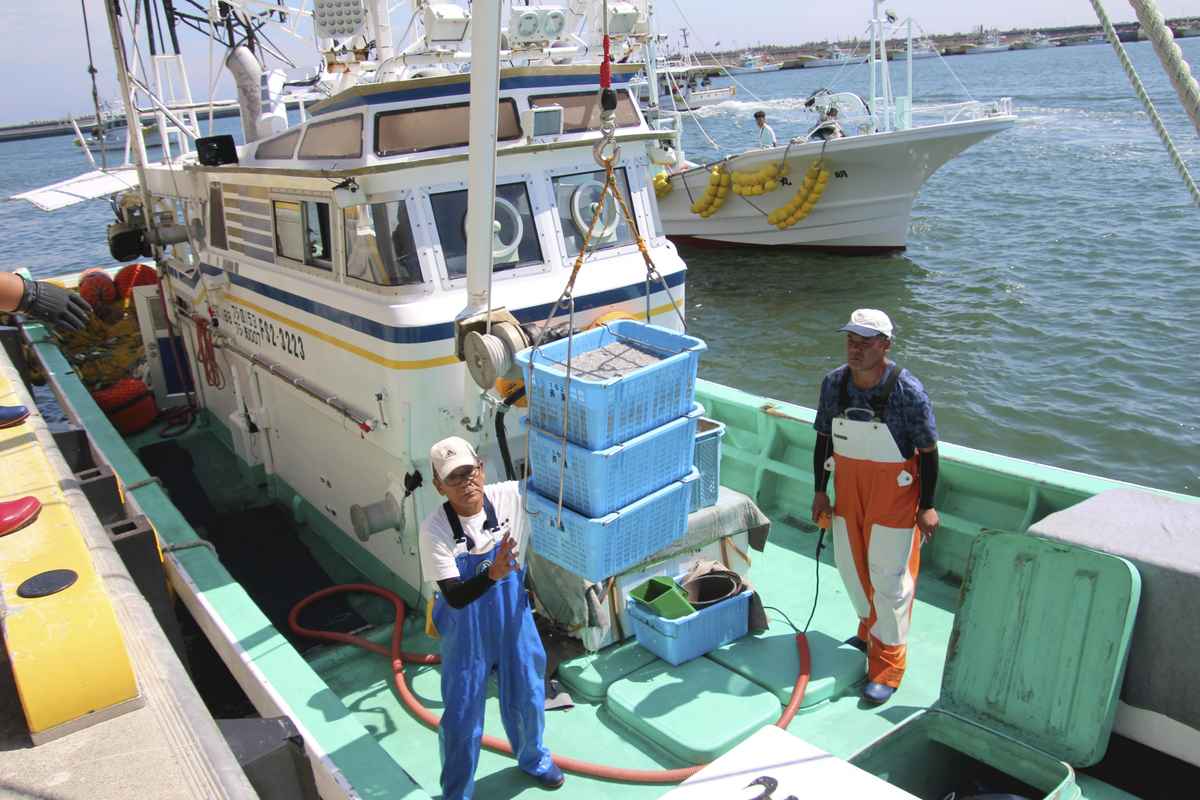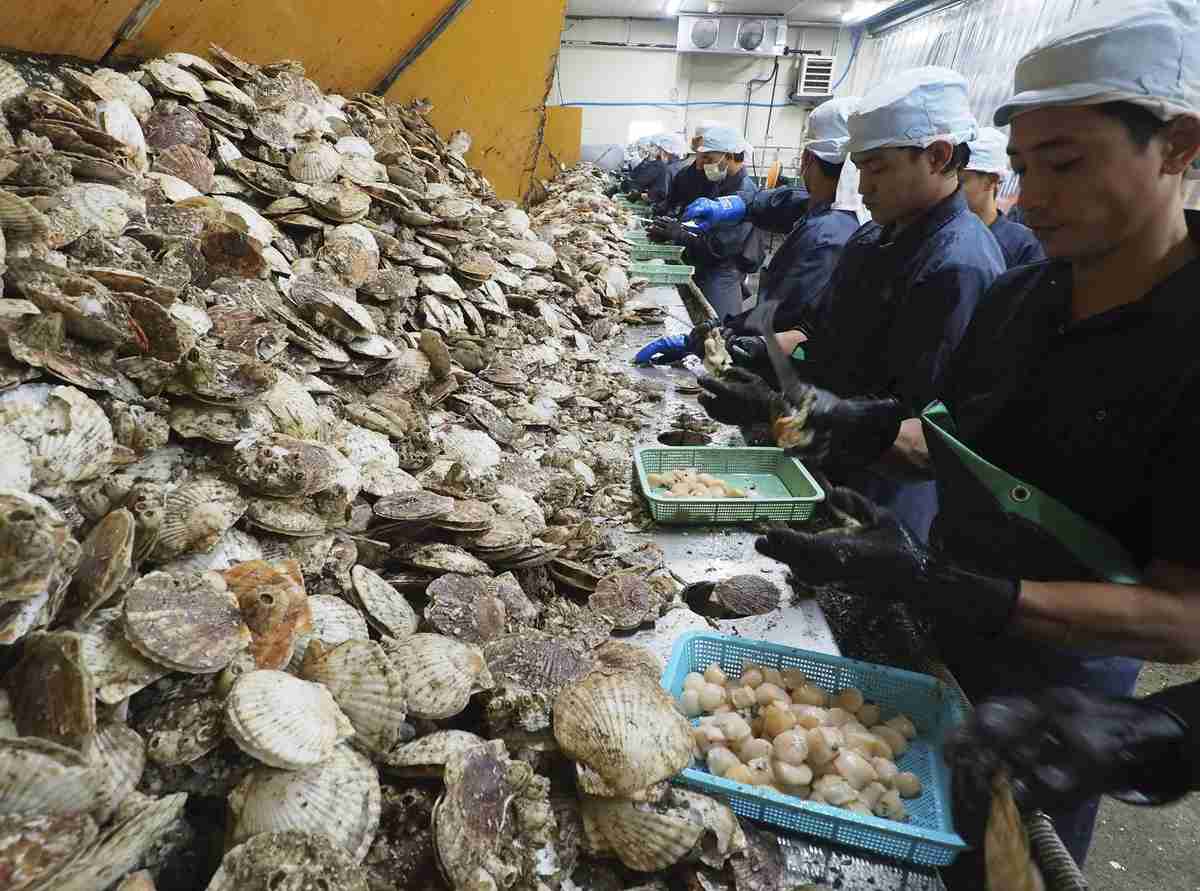August 25, 2025
TOKYO – Sunday marked two years since treated water began to be released into the ocean from the Fukushima No. 1 nuclear power plant. Recently, China has resumed imports of Japanese seafood products from 37 prefectures, including Hokkaido and Iwate, while keeping its ban in place for 10 prefectures, including Miyagi and Fukushima.
Fishery-related businesses, which have been struggling amid concerns about reputational damage, are increasingly expecting their customers to return while also accelerating efforts to develop sales channels in countries besides China.
Impact of U.S. tariffs
“China’s resumption of imports could save our business,” said the 55-year-old president of Maruuroko Sanwa Suisan Co., a seafood processing company in Monbetsu, Hokkaido. China has lifted its ban on seafood imports from Hokkaido, and about 15 of the company’s employees were busy shucking piles of scallops on Thursday.
When China imposed the ban, the company doubled exports to the United States. However, their sales negotiations are currently tied up due to U.S. tariff policy. While U.S. consumers prefer large scallops, this year’s scallops are smaller than usual and catches are expected to be slightly sparser. In addition, the 15% tariff that will be levied on Japan is raising concerns that U.S. consumers may hesitate to buy Japanese scallops.

Fishermen land their whitebait catches at a fishing port in Soma, Fukushima Prefecture, on Tuesday. PHOTO: THE YOMIURI SHIMBUN
Given the circumstances, the company has applied to resume exports to China, but it remains unclear how long inspections and other procedures will take. While the company holds out hope, the president is anxious to know how China will resume imports and to what extent it will do so.
Before the release of treated water, another seafood processing company in Miyako, Iwate Prefecture, was exporting 5,000 tons of Alaska pollock to China annually, managing each fish individually by computer and touting the high quality and safety of its products. After the ban was imposed, the company expanded its sales to Africa, and this year’s exports are more than double last year’s, at 2,500 tons.
However, it is cheaper to export to China than Africa. The company’s 69-year-old president, who is going through China’s procedures in preparation for the fishing season in February next year, was honest about the situation. “We are grateful to our business partners who supported us during difficult times, but being able to export to China means a lot to our business,” he said.
¥5.6 billion drop
Meanwhile, Miyagi Prefecture, which is still under the ban, is seeking to shift to new markets. According to Senda-Shiogama Branch Customs, exports of seafood and seafood products produced in the prefecture last year totaled ¥9.7 billion, down ¥5.6 billion from before the nuclear accident. At that time, exports to China accounted for one-fifth of all the prefecture’s seafood exports. The prefecture is now planning business meetings to support exports to Mexico, where there are many Japanese restaurants, in addition to backing exports to the United States and Southeast Asia.
Once discharge of treated water into the ocean began, Hokkaido scallops flooded the Japanese market, causing a sharp drop in the price of Miyagi Prefecture’s scallops. If exports to China resume, even partially, it may lead to higher prices and a higher sales volume for the prefecture’s scallops. “If there are more sales channels in Japan, that would be an opportunity,” said a 60-year-old in the prefecture’s city of Kesennuma who has farmed scallops for over 30 years.
‘Frustrating’
“We’re not going to ship fish containing radioactive substances [exceeding safety standards]. It’s frustrating that they’re not going to lift the export ban,” said a 64-year-old man who harvests sea lettuce in Soma, Fukushima Prefecture. Anticipating growing demand for sea lettuce in China, where consumers are increasingly health conscious, he wants to see the governments negotiate so the ban can be lifted as soon as possible.
In the prefecture’s city of Iwaki in May, local companies established a council promoting exports of seafood caught in the sea off the Joban region. They first plan to export processed flounder products to the Middle East and Asia starting next year. “We want to prove that products from the Joban region are the jewels of Fukushima Prefecture,” said the 29-year-old representative of the council.

